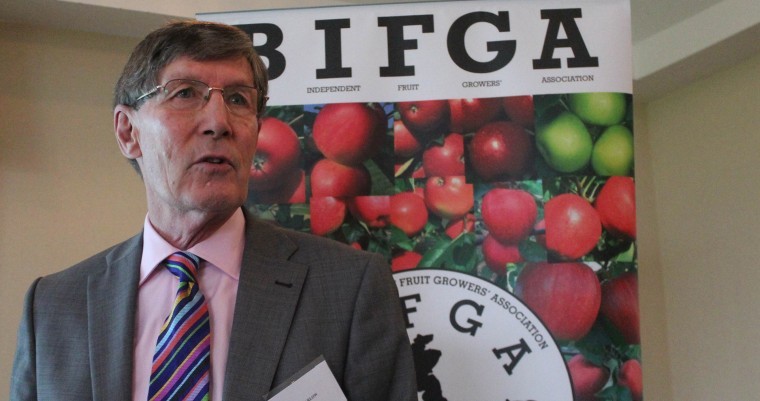The day was dominated by reports on work conducted by East Malling Research covering all elements of fruit production.
Michelle Fountain was the first researcher up, reporting on the Rhynchites weevil project funded by the Agriculture and Horticulture Development Board. A real issue for fruit quality, close monitoring has shown that this pest is first found when inner bud scales are visible, therefore there is no need to spray during flowering. Peak activity is at petal fall, allowing an extended window to spray before fruitlets are 15 millimetres diameter. Weevils were found in trees from six to 23 days pre flowering and eight to 16 days post, giving a substantial window of opportunity for control.
The explanation of trapping and sexing the weevils raised a smile across the group but this was an essential part of identifying a sex pheromone. Sadly there was no reaction to the volatiles collected with the conclusion that they were not responsive to each other. They were however responsive to benzyl alcohol which is released by the trees at bud break. This will lead to further work developing trapping and monitoring systems to aid control in the future.
Earwigs featured in both Michelle’s, Dr Saville’s and Andrew Tinsley’s presentations, the focus of much investigation, earwigs have been identified as wholly beneficial in top fruit. As omnivores they eat other insects as well as pollen and fruit waste, their preferred diet being woolly apple aphid, some codling moth eggs and pupae as well as sucker nymphs and eggs.
An investigation is underway for earwig friendly spraying regimes to sustain a beneficial population – only four per tree are needed for effective control of woolly aphid for instance. Michelle launched a call to action for growers who would be willing to participate in a new piece of work enhancing and rapidly establishing the ecology of new orchards. She requires six planned plantings, half will receive a boost of beneficial mycorrhizal preparations in the planting site with the establishment of floral strips coupled with heaps of prunings as a refuge for beneficial species. Growers need to contact Michelle direct if they are interested in participating.
Adrian Barlow from English Apples and Pears Ltd was the third speaker of the day, outlining strategies for getting supermarkets to trade fairly. Delivered on the day that Tesco announced a programme of long term supplier agreements, he talked of the need to have a strong and supportive partnership between marketing desks, growers and the retailer. He called on growers to understand that there was much to do supporting the buyers who, in the main, just didn’t have the time to do their job as we would like them to.
Opportunities are available to develop close trading relationships, he said, to be people who can support the buyer, help them in overcoming difficulties, presenting constructive solutions to problems. The ability to analyse sales, forward manage promotions (not cost but offering reputation enhancing information, promoting provenance etc) and do creative promotions that will engage strongly with consumers would only improve relationships.
Growers and marketing desks have an opportunity to influence and analyse in store merchandising, understand how online sales systems could be enhanced and present their products better. Much can be achieved by accurate crop forecasting, evolved sales plans and good crop information coupled with reduced costs in the supply chain and a clear statement of the returns necessary for survival and investment.




